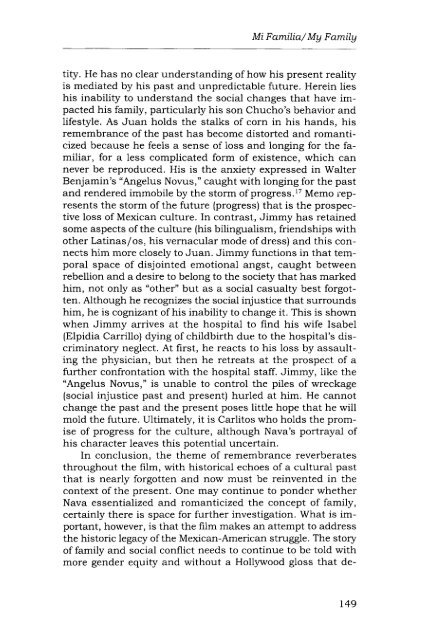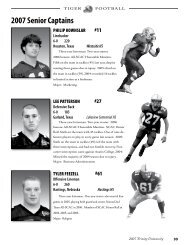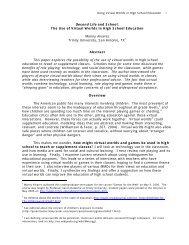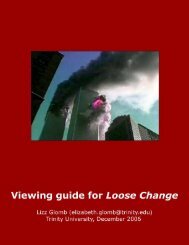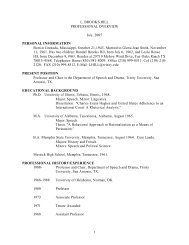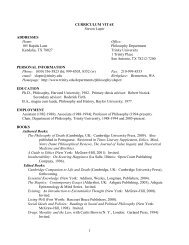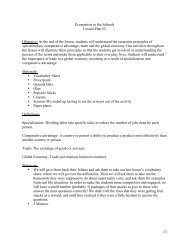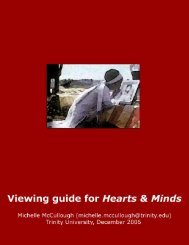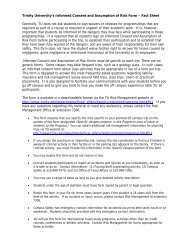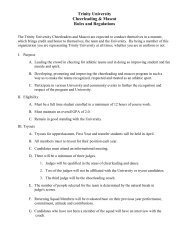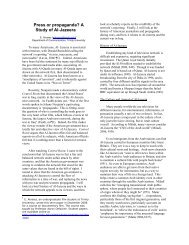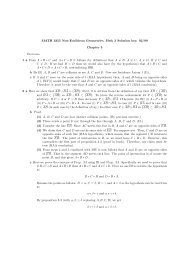Reviews - Trinity University
Reviews - Trinity University
Reviews - Trinity University
You also want an ePaper? Increase the reach of your titles
YUMPU automatically turns print PDFs into web optimized ePapers that Google loves.
Mi Familia/My Family<br />
tity. He has no clear understanding of how his present reality<br />
is mediated by his past and unpredictable future. Herein lies<br />
his inability to understand the social changes that have impacted<br />
his family, particularly his son Chucho’s behavior and<br />
lifestyle. As Juan holds the stalks of corn in his hands, his<br />
remembrance of the past has become distorted and romanticized<br />
because he feels a sense of loss and longing for the familiar,<br />
for a less complicated form of existence, which can<br />
never be reproduced. His is the anxiety expressed in Walter<br />
Benjamin’s “Angelus NOVUS,” caught with longing for the past<br />
and rendered immobile by the storm of progre~s.’~ Memo represents<br />
the storm of the future (progress) that is the prospective<br />
loss of Mexican culture. In contrast, Jimmy has retained<br />
some aspects of the culture (his bilingualism, friendships with<br />
other Latinas/os, his vernacular mode of dress) and this connects<br />
him more closely to Juan. Jimmy functions in that temporal<br />
space of disjointed emotional angst, caught between<br />
rebellion and a desire to belong to the society that has marked<br />
him, not only as “other” but as a social casualty best forgotten.<br />
Although he recognizes the social injustice that surrounds<br />
him, he is cognizant of his inability to change it. This is shown<br />
when Jimmy arrives at the hospital to find his wife Isabel<br />
(Elpidia Carrillo) dying of childbirth due to the hospital’s discriminatory<br />
neglect. At first, he reacts to his loss by assaulting<br />
the physician, but then he retreats at the prospect of a<br />
further confrontation with the hospital staff. Jimmy, like the<br />
“Angelus NOVUS,” is unable to control the piles of wreckage<br />
(social injustice past and present) hurled at him. He cannot<br />
change the past and the present poses little hope that he will<br />
mold the future. Ultimately, it is Carlitos who holds the promise<br />
of progress for the culture, although Nava’s portrayal of<br />
his character leaves this potential uncertain.<br />
In conclusion, the theme of remembrance reverberates<br />
throughout the film, with historical echoes of a cultural past<br />
that is nearly forgotten and now must be reinvented in the<br />
context of the present. One may continue to ponder whether<br />
Nava essentialized and romanticized the concept of family,<br />
certainly there is space for further investigation. What is important,<br />
however, is that the film makes an attempt to address<br />
the historic legacy of the Mexican-American struggle. The story<br />
of family and social conflict needs to continue to be told with<br />
more gender equity and without a Hollywood gloss that de-<br />
149


